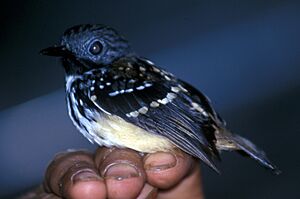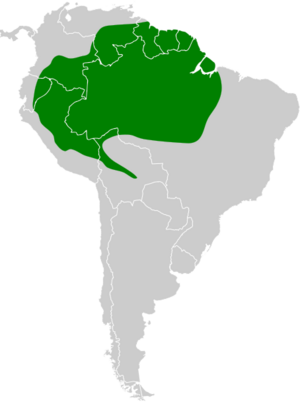Spot-backed antbird facts for kids
Quick facts for kids Spot-backed antbird |
|
|---|---|
 |
|
| Conservation status | |
| Scientific classification |
|
| Kingdom: | Animalia |
| Phylum: | Chordata |
| Class: | Aves |
| Order: | Passeriformes |
| Family: | Thamnophilidae |
| Genus: | Hylophylax |
| Species: |
H. naevius
|
| Binomial name | |
| Hylophylax naevius (Gmelin, JF, 1789)
|
|
 |
|
| Script error: The function "autoWithCaption" does not exist. | |
| Synonyms | |
|
Hylophylax naevia |
|
Script error: No such module "Check for conflicting parameters".
The spot-backed antbird (Hylophylax naevius) is a small, colorful bird. It belongs to a bird family called Thamnophilidae, which are often known as antbirds. These birds are found in the warm, wet forests of South America. You can spot them in countries like Bolivia, Brazil, Colombia, Ecuador, French Guiana, Guyana, Peru, Suriname, and Venezuela. They love living in moist lowland forests and tropical swamps.
Contents
About the Spot-Backed Antbird
The spot-backed antbird gets its name from the cool spots on its back. These spots help it blend in with the dappled light of the forest. It's a small bird, but it's an important part of its ecosystem.
Where Do Spot-Backed Antbirds Live?
These birds live in the tropical and subtropical areas of South America. Their favorite places are lowland forests that get a lot of rain. They also like swampy areas where there's plenty of water and dense plants. This type of habitat provides them with food and places to hide.
What Do Spot-Backed Antbirds Eat?
Like many antbirds, the spot-backed antbird mainly eats insects. They often follow swarms of ants, catching the insects that try to escape the ants. This is a clever way to find food! They also might eat other small invertebrates they find in the forest.
Spot-Backed Antbird Family Tree
Scientists group living things into categories to understand them better. The spot-backed antbird is part of a group called Hylophylax. This group includes two other similar bird species.
How Scientists Name Birds
The spot-backed antbird was first officially described in 1789. A German scientist named Johann Friedrich Gmelin gave it its first scientific name. He used a system called binomial nomenclature, which gives every species a two-part name. The second part of its name, naevius, comes from a Latin word meaning "spotted." This makes sense because of the spots on its back!
Different Types of Spot-Backed Antbirds
Just like people can have different looks depending on where they're from, birds can too. Scientists have found five different types, or subspecies, of the spot-backed antbird. These subspecies live in slightly different areas of South America.
- H. n. theresae: Found in parts of Ecuador, Peru, and western Brazil.
- H. n. peruvianus: Lives in central northern Peru.
- H. n. inexpectatus: Found in southeastern Peru, southwestern Brazil, and northwestern Bolivia.
- H. n. naevius: This is the original type, found from southeastern Colombia and northeastern Ecuador to the Guianas, northern Peru, and northern Brazil.
- H. n. ochraceus: Lives in central and southeastern Amazonian Brazil.
 | Sharif Bey |
 | Hale Woodruff |
 | Richmond Barthé |
 | Purvis Young |


